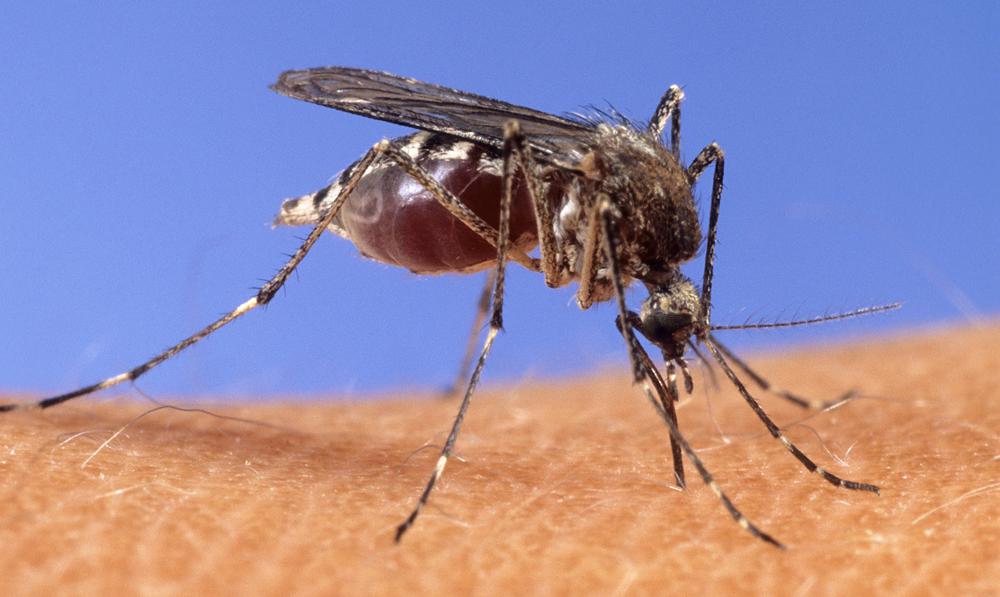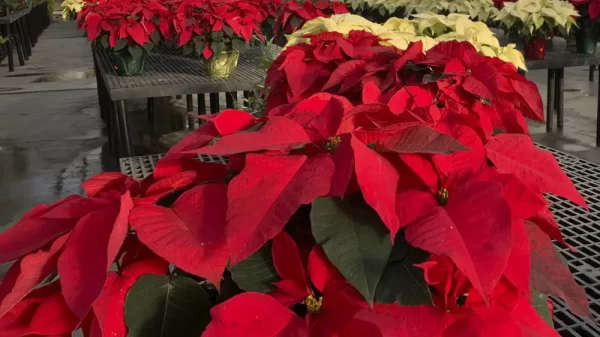This image provided by the USDA Agricultural Research Service shows a closeup of a mosquito on human skin. (USDA Agricultural Research Service via AP)
Life comes with lots of little annoyances, few of them littler or more annoying than mosquitoes. Just about everyone who spends any time outdoors will be bothered by the bloodsucking party poopers at one point or another.
Although it may seem difficult to avoid mosquitoes, there are several easy measures you can take to reduce or eliminate them from your yard and garden. The best control is prevention.
With the exception of those who live near a lake, marsh or swamp — or in densely packed neighborhoods — most of the blame for mosquito invasions usually falls on the property’s residents. Mosquitoes need only one-quarter inch of water to breed — and a female can lay hundreds of eggs at a time.
Inspect your property for standing water. Even the most diligent among us will likely find water collected in a children’s playset, tire, clogged gutter, pot saucer, overturned trash can lid or flying disc toy. Drain or dump water as you see it, even if the amount appears insignificant, and drill drainage holes in the bottoms of vessels like tire swings.
For water that’s intended to stand, such as in ponds and bird baths, the bacterium Bacillus thuringiensis israelensis (Bti) is a safe and effective way to kill mosquito larvae. Several strains of Bt are available, each targeting different insects, so be sure to buy the israelensis strain to target mosquitoes. The product is also effective against black flies and fungus gnats.
Bti comes in various forms, including donut-shaped briquettes called “Mosquito Dunks.” The floating rings offer 30 days of protection and “will not harm people, pets and other animals, aquatic life, or other insects, including honeybees,” according to the CDC.
If you don’t have a pond or bird bath, you can make a DIY mosquito trap: Add a handful of straw, hay or grass clippings to a (preferably dark-colored) pail filled with water, and let it sit for 1-2 days. Then add one mosquito dunk. For large infestations, tuck several buckets around the yard. The decomposing organic matter will attract the insects, which will lay eggs on the treated water. Replace water and add a fresh dunk every 30 days to thwart future generations of mosquitoes.
Mosquitoes also like to hunker down among weeds and overgrown vegetation. Keep the yard tidy.
Running a standing or box fan at high speed will significantly reduce mosquito activity on your porch, deck or patio. It works by literally blowing the insects away and dispersing our exhaled carbon dioxide, which would otherwise attract them. You’ll keep cooler, too.
Avoid using insecticidal foggers or sprays, which threaten essential pollinators and other beneficial insects while controlling only a small portion of the adult mosquito population. In addition, such applications would need to be repeated multiple times per season.
So-called “mosquito plants” and other plants marketed as repellents do, indeed, contain oils or chemicals that the insects find unappealing. But they’re not effective unless those compounds are released, such as by crushing the leaves. Merely having such a plant in the garden or a pot will not provide any benefit.
Various research studies have shown citronella candles containing lemongrass oil provide mild-to-moderate protection. The jury is out on whether the benefit can be attributed to the repellant properties of the active ingredient, the candle’s ability to mask the human scent or if the flame itself is the deterrent.
In case you’re wondering, mosquitoes do serve a purpose — as pollinators and bird food. Still, because the roles they serve in these areas are minor, eliminating them from your yard will not adversely affect the ecosystem.
Itchy welts aside, many of us live or vacation in areas where mosquitoes can transmit viruses like West Nile, Zika, dengue and chikungunya, and parasitic illnesses like malaria. Pets are at risk, too, with heartworm disease posing the most significant threat.
Wearing long sleeves and pants, reducing time spent outdoors between dusk and dawn, when mosquitoes are most active, and keeping up to date with pets’ heartworm prevention treatments will go a long way toward reducing mosquito bites.
And remember, you don’t live in a barn. Keep the door closed.
—-
Jessica Damiano writes regular gardening columns for The Associated Press. Her Gardening Calendar was named a winner in the 2021 Garden Communicators International Media Awards.
Copyright 2021 Associated Press. All rights reserved.
Source: https://apnews.com/article/gardening-how-to-get-rid-of-mosquitoes-5c4d3f0eb5c6980afe45fed66c04a153










































